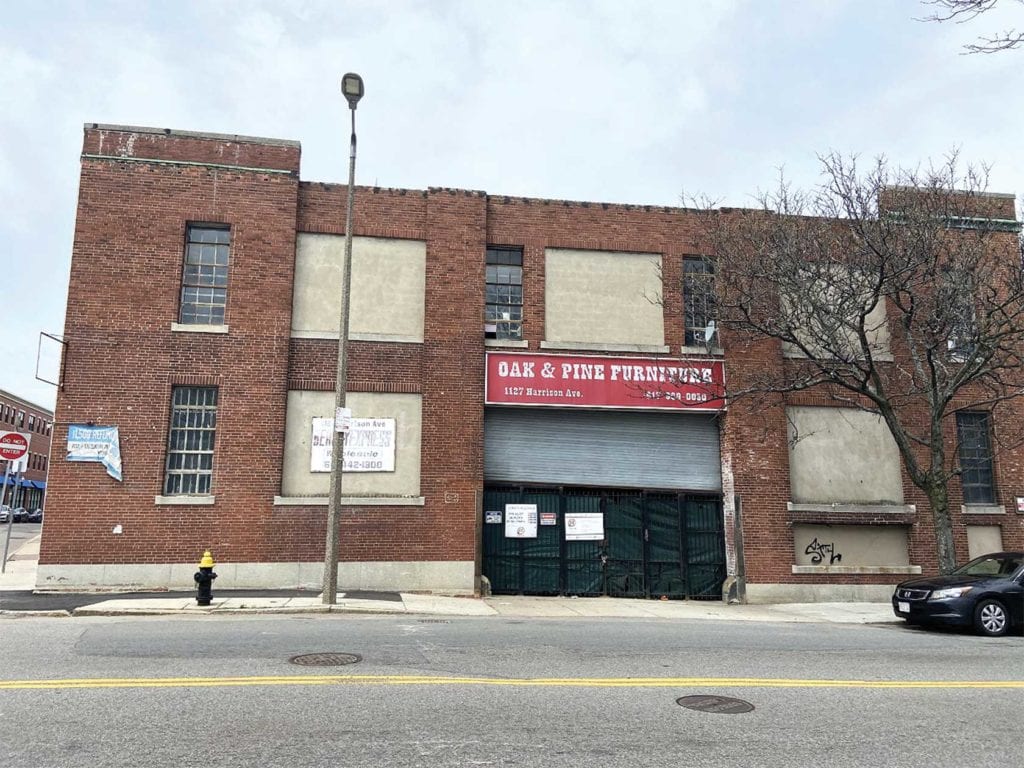
Local developers have introduced a project in Nubian Square to add floors and introduce co-living spaces to a Nubian Square building. The proposed project at 1127 Harrison Ave would bring 94 micro-units with shared amenity spaces, 12 income-restricted units, and renovations to the commercial space.
On April 21, the Boston Planning and Development Agency held a public meeting to introduce the full project to the public for the first time, drawing resistance from some community members and support from others.
BPDA project manager Stephen Harvey led the meeting and fielded questions along with the developers Boston Real Estate Collaborative (BREC) and Grove Hall NDC and architects Monte French Design Studio.
The 20,383-square-foot parcel at the corner of Harrison Avenue and Palmer Street currently contains a mixed commercial-space building with a few small businesses. The intention in adding floors is to encourage economic activity among city-owned parcels like the Blair Lot and the proposed buildings at Harrison Avenue.
“At its core, the project is really focused on nurturing and creating opportunity for local small businesses,” said Scott Kirkwood, project manager with BREC. “We also want to provide sensible and efficient housing that really responds to the needs of today’s growing workforce.”
The project would expand the two-story existing building to five stories and renovate the remaining commercial space. The new micro-unit apartments on the upper floors are meant to serve locals who have a hard time affording full-size, market-rate units alone but also don’t qualify for subsidized housing. The team names teachers, service employees, nurses and other essential workers as their target residents.
The co-living is identified by small studio-like apartments with kitchenettes and bathrooms, along with 5,000 square feet of shared full kitchens and lounge spaces throughout to create a community among the residents. This style of apartment is usually marketed to young professionals who don’t want roommates. However, for many who viewed the project for the first time, it is reminiscent of dorm living, and even tenement housing.
“When I heard you describing the living, that sounds like a dorm to me … and in this case a really expensive dorm in the community,” said former City Councilor Tito Jackson during the meeting. “So that is, to me, problematic.”
Jackson asked that the developers commit to making sure that no undergraduate students overload the building.
BREC managers say that the sizes of the units, on average 320 square feet, and the amenities, exceed that of current dorm housing and the tenements of yesterday. Jackson added that this is very attractive to college students and if the developers don’t agree to a restriction, it will take away more housing from community members.
“I didn’t bring up the fact that, with doing multiple projects in around this area, your core team still is not representative,” Jackson said.
BREC owner Will Avanessian said that the team will work with local Main Streets directors, local brokerage houses and small business organizations to manage the tenant base and make it representative of the area. Robert George, executive director of Roxbury Main Streets, has already expressed his support for the project.
They also plan not to adhere strictly to the September rent cycle, when most students are securing housing, but did not commit to barring students from the development.
One of the organizations BREC representatives say they plan to work with is African Community Economic Development of New England, one of the small-business organizations that supports the project. Founder Abdul Hussein told the Banner that he’s very excited to see that BREC will facilitate renovations of the building without displacing a single commercial tenant.
“Our constituency, a lot of them have businesses that have been suffering for some time because of the condition of the building,” Hussein said.
One of those businesses is Merkato Mart, run by Lebeza Alemu.
Some of the existing building’s problems, Alemu said, include mice, non-functioning toilets and broken heaters.
“BREC buys it and says they’re going to renovate, and we are very happy. They promised to keep us in there, they will accommodate us,” Alemu told the Banner.
Alemu has operated the Ethiopian market and bakery for 15 years, and said it is one of the only ethnic Ethiopian markets in Boston. Another African restaurant, Bintimani, was evicted from the building last August after BREC bought the building in 2019.
BREC representatives declined to comment on previous tenants of the building.
Alemu has seen the drawings for the project and said the renovations and other promises BREC has made will mean a lot to his business.
“They are not going to increase the rent on us, when they finish. Officially, they gave us a letter,” Alemu said.
BPDA representative Harvey said they plan to hold another public meeting to get more feedback while the project is under review.






